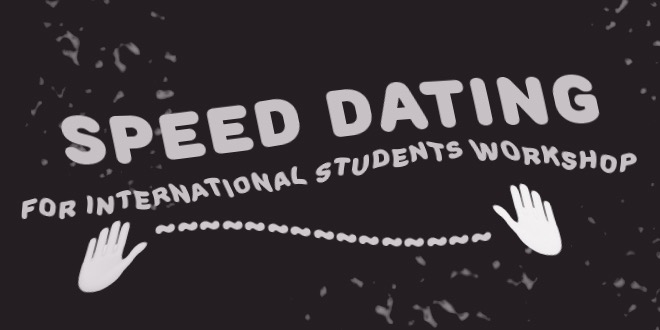Speed Dating for International Students Workshop

Image by Maddy Pease
On April 24, Bruin Consent Coalition (BCC) hosted a workshop entitled “Speed Dating for International Students: What Happens Next?” in partnership with the Dashew Center. As part of BCC’s events for Sexual Assault Awareness Month, the workshop in the Dashew Center Board Room aimed to educate international students on consent, sexual violence, and rape culture as well as compare and contrast American relationship norms with those from their home countries.
Representatives of the Dashew Center, BCC, and Counseling and Psychological Services (CAPS) led the two-hour long interactive session. First, the Dashew Center covered the topic of pursuing relationships and understanding romantic and sexual cultural norms in America as an outsider. Next, BCC addressed consent, rape culture and healthy versus unhealthy relationships. Finally, CAPS introduced self-care and on-campus resources for dealing with any kind of harassment or abuse.
The first presentation prompted those who attended to discuss and share their responses to questions such as “What are some cultural differences, i.e. views about sex, commitment, public displays of affection, saying ‘I love you,’ between America and other places in the world?” and “What makes it more difficult to navigate intimate inclinations and interactions when you haven’t grown up in America?” Some of the international students who attended voiced the difficulties they’d had meeting new people in an environment with social norms they could not initially navigate. Others spoke on the cultural differences on the lines drawn between “friends hanging out” and “people dating or being romantically linked.” One student mentioned how back home in France, going dancing with a girl he didn’t know that well would never be mistaken for a date while here in America, that same scenario would be viewed as intimate.
The second and third presentations were information-based as the presenters aimed to clearly define terms like consent, victim blaming, sexual violence, rape culture, and later, self-care, healthy versus unhealthy relationships, and psychological services. The second presentation started with a popular video, “Tea Consent,” which explains consent in colloquial terms by equating sexual activity to drinking tea. BCC went on to share statistics about partner abuse, a video on possessive relationships, and microaggressions that worsen victim blaming such as the phrase “she was asking for it.”
In the third presentation, the attendees were informed about the resources and support that CAPS provides to UCLA students, U.S. citizens or otherwise. A significant theme was that of self-care, with pamphlets and checklists handed out to the audience that encouraged them to make time for stress relieving activities every so often and to incorporate these into any relationship, romantic or platonic, to keep it healthy.
Most of the audience had found out about the workshop through a Dashew Center newsletter. After its conclusion, Paige Zhang, a second-year graduate student, said that she liked the references to pop culture throughout the workshop used to illustrate American cultural norms and the educational aspect about consent as it is a topic that goes largely unaddressed in her home country, China. Zhang added that she “was looking for more cross-cultural comparison in terms of how dating works.” She stressed that dating at home is very different than it is at UCLA, making it harder to understand how to enter the dating circuit. “I often don’t know whether what I’m seeing and what I’m experiencing is due to cultural differences or just individual differences,” said Zhang. Though the workshop began to talk about some of these issues that international students face, she said they could have been explored more personally.
The workshop did a great job of addressing a topic that is not usually addressed: what feminism needs to be for students new to this country and this institution. BCC’s efforts to make Sexual Assault Awareness Month accessible to as many people as possible are evident and appreciated by those who attended this workshop.




